- Home
- Mildred A. Wirt
Signal in the Dark Page 2
Signal in the Dark Read online
Page 2
CHAPTER 1 _HELP WANTED_
"The situation is getting worse instead of better, Penny. Three of ourreporters are sick, and we're trying to run the paper with only a thirdof our normal editorial staff." Anthony Parker, publisher of the_Riverview Star_, whirled around in the swivel chair to face his daughterwho sat opposite him in the private office of the newspaper. "Frankly,I'm up against it," he added gloomily.
Penny, a slim girl with deep, intelligent blue eyes, uncurled herselffrom the window ledge. Carefully, she dusted her brown wool skirt whichhad picked up a cobweb and streaks of dirt.
"You could use a janitor around here too," she hinted teasingly. "Howabout hiring me?"
"As queen of the dustmop brigade?"
"As a reporter," Penny corrected. "I'm serious, Dad. You're desperate foremployes. I'm desperate for spending money. I have three weeks schoolvacation coming up, so why not strike a bargain?"
"The paper needs experienced workers, Penny."
"Precisely."
"You're a very good writer," Mr. Parker admitted. "In fact, in monthspast you turned in some of the best feature stories the _Star_ everprinted. But always they were special assignments. We must have areporter who can work a daily, eight-hour grind and be depended upon tohandle routine stories with speed, accuracy and efficiency."
"And you think I am not what the doctor ordered?"
"I think," corrected Mr. Parker, "that you would blow your pretty littletop by the end of the second day. For instance, it's not easy norpleasant to write obituaries. Yet it must be done, and accurately. Onthis paper, a new reporter is expected to do rewrites and other tediouswork. You wouldn't like it, Penny."
"I'd take it neatly in my stride, Dad. Why not try me and see?"
Mr. Parker shook his head and began to read the three-star edition of thepaper, its ink still damp from the press.
"Give me one sound, logical reason for turning me down," Penny persisted.
"Very well. You are my daughter. Our editors might feel that they werecompelled to treat you with special consideration--give you the bestassignments--handle you with kid gloves."
"You could take care of that matter easily enough."
"If they took my instructions seriously, you might not like it," thenewspaper owner warned. "A reporter learns hard and bitter lessons. Mr.DeWitt, for instance, is a fine editor--our best, but he has a temperand--"
The frosted glass door swung open and an elderly, slightly bald man inshirt sleeves slouched in. Seeing Penny, he would have retreated, had notMr. Parker called him back.
"What's on your mind, DeWitt?"
"Trouble," growled the editor. "That no-good, addle-brained boy we hiredas night police reporter, just blew up! Said it was too confining to sitin a police station all night waiting for something to happen! So he getshimself a job in a canning factory! Now we're another employee short."
"Dad, let me take over the night police job!" Penny pleaded.
Both her father and Mr. DeWitt smiled as if suffering from intense pain."Penny," Mr. Parker explained gently. "Night police work isn't suitablefor a girl. Furthermore, it is one of the most undesirable jobs on apaper."
"But I want to work somewhere, and you're so stubborn!"
Mr. DeWitt studied Penny with concentrated interest. Hope flickered inhis eyes. Turning abruptly to Mr. Parker he asked: "Why not, Chief? Wecould use her on the desk for rewrite. We're mighty hard up, and that's afact."
"What about the personnel problem?" Mr. Parker frowned. "How would thestaff take it?"
"Some of the reporters might not like it," Mr. DeWitt admitted, "butwho's running this paper anyhow?"
"I often wonder," sighed Mr. Parker.
Detecting signs of a weakening, Penny appealed to Mr. DeWitt. "Wouldn't Ibe a help to you if I were on the staff?" she urged.
"Why, sure," he agreed cautiously.
"There, you see, Dad! Mr. DeWitt wants me!"
"Penny, it's a personnel problem," her father explained with growingimpatience. "The other reporters might not consider you a welcomeaddition to the staff. You would expect favors."
"I never would!"
"We need her," said Mr. DeWitt significantly. "We really do."
With two against him, Mr. Parker suddenly gave in.
"All right," he agreed. "Penny, we'll put you on as a cub reporter. Thatmeans you'll start as a beginner with a beginner's salary and do routinework until you've proved your merit. You'll expect no specialconsideration. Is that understood?"
"Perfectly!" Grinning from ear to ear, Penny would have agreed toanything.
"Furthermore, if the work gets you down, I won't have you coming to measking for a change."
"I'll never darken your office door, Dad. Just one question. How muchmoney does a beginner get?"
"Twenty-five dollars."
Penny's face was a blank.
"It will be more than you are worth the first few weeks," Mr. Parkersaid.
"I'll take it," Penny declared hastily. "When do I start?"
"Right now," decided her father. "DeWitt, introduce her to the staff, andput her to work."
Feeling highly elated but a trifle self-conscious, Penny followed EditorDeWitt past the photography studio and the A.P. wire room to the mainnewsroom where reporters were tapping at their typewriters.
"Gang," said Mr. DeWitt in an all inclusive introduction. "This is PennyParker. She'll be working here for a few weeks."
Heads lifted and appraising eyes focused upon her. Nearly everyone noddedand smiled, but one girl who sat at the far end of a long typewritertable regarded her with an intent, almost hostile stare. And as luckwould have it, Mr. DeWitt assigned Penny to the typewriter adjoininghers.
"This is Elda Hunt," he introduced her. "Show Penny the ropes, will you?"
The girl, a blonde, with heavily-rouged cheeks, patted the rigid rolls ofher hair into place. Staring at Mr. DeWitt, she answered not a word.
"I'll have a lot to learn," Penny said, trying to make friendlyconversation.
Elda shrugged. "You're the publisher's daughter, aren't you?" sheinquired.
"Yes."
"Then I don't think you'll have too hard a time," the girl drawled.
Penny started to reply, but thought better of it. Seating herself besideElda, she unhooded the typewriter, rolled a sheet of copy paper into it,and experimented with the keys.
The main newsroom was a confusion of sound. Although work was beinghandled with dispatch, there was an air of tension, for press time on thefive-star edition was drawing close. Telephones were ringing, and EditorDeWitt, who sat at the head of the big rectangular desk, tersely assignedreporters to take the incoming calls. Not far from Penny's ear, thepolice shortwave radio blared. Copy boys ran to and fro.
Benny Jewell, the assistant editor, tossed her a handful of typewrittensheets.
"Take these handouts and make 'em into shorts," he instructed briefly.
"Handouts?" Penny asked in bewilderment. "Shorts?"
"Cut the stories to a paragraph or two each."
"Oh," said Penny, catching on. "You want me to rewrite them."
At her elbow, Elda openly snickered.
Color stained Penny's cheeks, but she quietly read the first sheet, whichwas an account of a meeting to be held the following week. Picking outthe most important facts, she boiled the story down to two shortparagraphs, and dropped the finished copy into the editor's wire basket.
Only then did Elda speak. "You're supposed to make two carbons of everystory you write," she said pityingly.
The girl might have told her sooner, Penny thought. However, she thankedher politely, and finding carbon paper, rewrote the story. In hernervousness she inserted one of the carbons upside down, ruining theimpression. As she removed the sheets from the machine, she saw what shehad done. Elda saw too, and smiled in a superior way.
"She dislikes me intensely," Penny thought. "I wonder why? I
've not donea thing to her."
Aware that she had wasted paper and valuable time, Penny recopied thestory a third time and turned it in to the editor. After that, sherewrote the additional stories with fairly good speed. By watching otherreporters she learned that the carbon copies were speared on spindleswhich at intervals a copy boy collected and carried away.
A telephone rang, and this time, Mr. DeWitt, looking straight at Penny,said: "An obituary. Will you take it?"
She went to the phone and copied down the facts carefully, knowing thatwhile death notices were routine, they were of vital interest to readersof the paper. Any mistake of fact could prove serious.
Returning to her typewriter, she wrote the item. But after she had turnedit in, Mr. DeWitt called her to his desk. He was pleasant but firm.
"What day are services to be held?" he asked. "Who are the survivors?Where did the woman die? Furthermore, we never use the word 'FuneralHome'. Instead, we say 'mortuary'."
Penny telephoned for more information, and finally after rewriting thenotice twice more, succeeded in getting it past Mr. DeWitt. But as hetossed the story to a copy reader, she saw that he had pencilled severalchanges.
"There's more to writing routine stories than I thought," she reflected."I'll really have to dig in unless I want to disgrace Dad."
Penny was given another obituary to write which proved nearly asdifficult as the first. Hopelessly discouraged, she started for the restroom to get a drink and wash her hands.
As she entered the lounge, voices reached her ears, and instantly sherealized that Elda Hunt was talking to another girl reporter about her.
"The publisher's daughter!" she heard her say scathingly. "As if wearen't having a hard enough time here, without having to coddle heralong!"
"I didn't think she seemed so bad," the other replied. "She'll catch on."
"She'll be promoted over all our heads if that's what you mean!" Eldaretorted bitterly. "I know for a fact, she's starting at fifty a week,and no experience! If you ask me, it's unfair! We should walk out ofhere, and see how those fine editors would like that!"

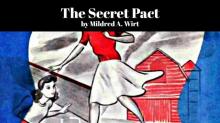 The Secret Pact
The Secret Pact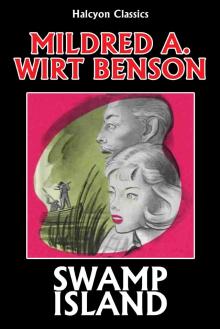 Swamp Island
Swamp Island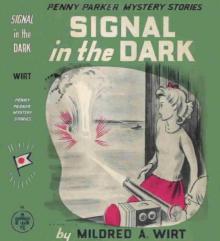 Signal in the Dark
Signal in the Dark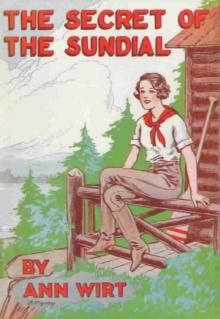 The Secret of the Sundial
The Secret of the Sundial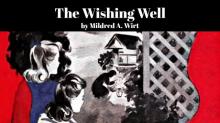 The Wishing Well
The Wishing Well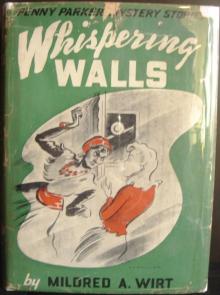 Whispering Walls
Whispering Walls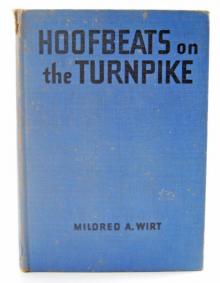 Hoofbeats on the Turnpike
Hoofbeats on the Turnpike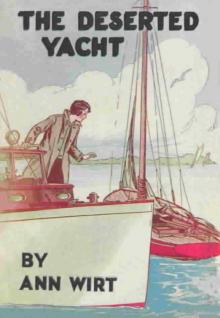 The Deserted Yacht
The Deserted Yacht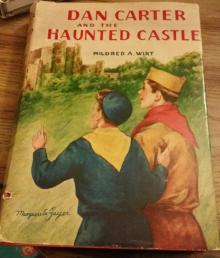 Dan Carter and the Haunted Castle
Dan Carter and the Haunted Castle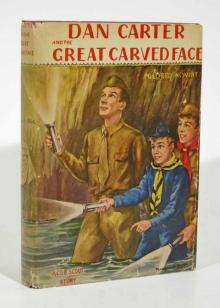 Dan Carter and the Great Carved Face
Dan Carter and the Great Carved Face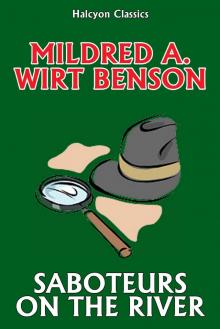 Saboteurs on the River
Saboteurs on the River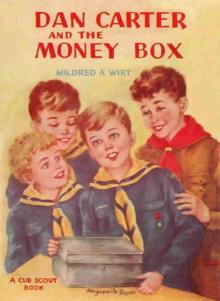 Dan Carter and the Cub Honor
Dan Carter and the Cub Honor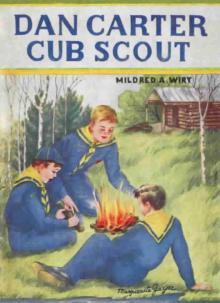 Dan Carter-- Cub Scout
Dan Carter-- Cub Scout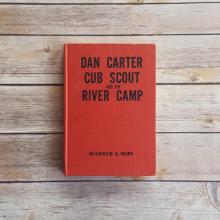 Dan Carter, Cub Scout, and the River Camp
Dan Carter, Cub Scout, and the River Camp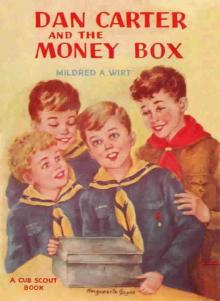 Dan Carter and the Money Box
Dan Carter and the Money Box The Girl Detective Megapack: 25 Classic Mystery Novels for Girls
The Girl Detective Megapack: 25 Classic Mystery Novels for Girls